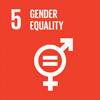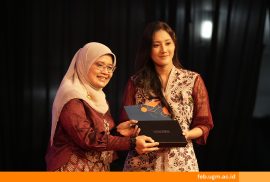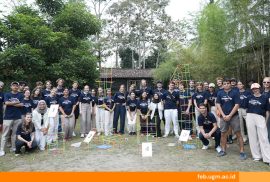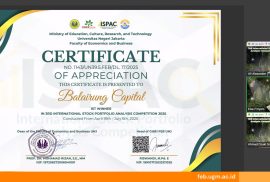
Do you want to deepen your understanding of management from a scientific research perspective? The Master of Science in Management (M.Sc. Management) Program at the Faculty of Economics and Business, Universitas Gadjah Mada (FEB UGM), offers an academic pathway designed for aspiring researchers, lecturers, and professionals who seek to expand their research-based knowledge, unlike the Master of Management (MM) program, which focuses on business practice, the M.Sc. The management program emphasizes research.
Head of the M.Sc. Management Study Program, Dr. Sahid Susilo Nugroho, M.Sc., highlighted that the program not only produces academics but also professionals equipped with systematic tools and ways of thinking.
“Our hope is not only to prepare qualified lecturers but also data analysts who can be useful for the industry,” he said during the FEB Overview Sharing Session: Preparing for an Excellent Career in the Digital Era with M.Sc. Management FEB UGM broadcast on FEB UGM’s YouTube channel recently.
Sahid explained that the program offers finance, marketing, human resources, knowledge and innovation, strategic management, and Islamic finance concentrations. As a response to the needs of the times and the challenges of disruption, the program integrates Artificial Intelligence (AI), Machine Learning (ML), and Natural Language Processing (NLP). The focus is not on producing data scientists but on business analysts capable of applying Python and other data libraries to address real managerial issues. The approach remains relevant and understandable, although students come from diverse academic backgrounds.
Beyond technical skills, students also grow in their emotional and spiritual lives. They are encouraged to engage in social projects such as MD Social Local Friend and to discuss in a supportive environment. They are required to participate in international conferences as part of their scientific development. These conferences provide a platform for students to present their theses as working papers, which they later develop into published articles. Interestingly, the program fully funds the entire process.
This program is open to graduates from all disciplines, not only from FEB. A one-semester, two-credit matriculation program covering basic management and quantitative methods ensures that non-economics graduates have the same knowledge level as other students before entering the regular semesters. Admission requirements include a minimum TOEFL score of 475, a TPA score of at least 500, and taking the Tes Potensi Keilmuan (TPK). During interviews, applicants undergo an assessment of their research plans, basic management knowledge, and scientific communication skills.
The program provides comprehensive facilities. Students can access international journals, research databases, and analytical software such as STATA, SPSS, and SampleS. Towards graduation, they also receive career preparation training, resume building, LinkedIn profile development, and mock job interviews. AACSB has internationally accredited the program for three consecutive periods and has received the highest “Unggul” accreditation from LAMEMBA. Internationalization is not just a status but demonstrated through real collaborations: international publications, participation in global conferences, and visiting lecturers from abroad—invited to bring AI and innovation issues into a business context.
Active student of the M.Sc. Management Program, Novri Andini Zahirah, shared her experience. After completing her bachelor’s degree and working for a while, she decided to pursue further study to strengthen her research foundation and strategic skills. One of her most memorable experiences was attending a three-day guest lecture from Austria, where students practiced coding, creating prompts, and exploring the role of AI in business strategy.
“In that session, we learned how to create prompts and discussed the benefits of AI in business. We received training to live alongside AI and not be afraid of being replaced by it,” Novri explained.
According to her, studying for the M.Sc. The management program has shaped her thinking to become more structured and systematic. She also felt improvements in research ability, communication, and scientific mindset. The support from peers and lecturers includes scholarship opportunities and involvement in academic projects. Novri advised prospective students to prepare a research plan early on.
“During the interview, they will ask about your research plan. So you need to know the topic you want to pursue. Also, review the basics such as financial management, marketing, statistics, and communication,” she said.
Novri herself receives the Beasiswa Unggulan (Outstanding Scholarship), which requires a Letter of Acceptance (LoA) and an ongoing status up to the third semester. In addition to this scholarship, the program also offers internal scholarships and is open for applicants through the regular track and the LPDP scheme.
Currently, the M.Sc. Management program offers three main tracks: the regular program (2 years), the PMDSU program (4 years straight through to doctoral study), and a dual degree program in collaboration with Curtin University, Australia. Students in the dual degree program spend one year at UGM and one year in Australia, graduating with two degrees: Master of Science in Management and Master of Commerce (M.Com).
The program also emphasizes study-life balance. Field trips are organized before exams to refresh the mind and provide strong support for student mental health. We also offer career training to prepare graduates for the job market.
With its adaptive and integrative approach, the M.Sc. The management program at FEB UGM stands out as one that responds to today’s needs by combining research, technology, and humanity. For those who want to go beyond theory and are ready to face the challenges of the future business world, this is a place worth considering.
Report by: Orie Priscylla Mapeda Lumalan
Sustainable Development Goals:











